Stanford professor speaks on media and election politics

Secretary General of the Kofi Annan Commission on Elections and Democracy in the Digital Age Stephen Stedman discussed the hindrances of the internet age on the democratic election process and provided recommendations for steps the government can take to lessen the disruption of fair democratic election through media to more than 50 people at Ronald Tutor Campus Center Wednesday.
The conversation, which was moderated by Center for the Political Future director Bob Shrum and Global Policy Institute director Steve Lamy, elaborated on the findings from the Report of the Kofi Annan Commission on Elections and Democracy in the Digital Age released in January, which detailed the impacts of social media in elections.
The Annan Commission aims to protect the legitimacy of democracy. Its recent report shared data about new democracies globally and provided recommendations for governments hoping to protect democracy from the threats of technology, including misinformation and propaganda.
Stedman, a professor at Stanford University, said countries with high polarization like the United States were likely to face disinformation.
“If you are a country, like the United States, that has pre-existing high levels of polarization, has pre-existing high levels of distrust in institutions and has highly partisan traditional media, you are going to be particularly vulnerable to network propaganda, disinformation [and] hate speech,” Stedman said.
Stedman said the U.S. climate of polarization and distrust was considered abnormal to those of other democracies. He said the upcoming election will be heavily impacted by dishonest advertisements, including hacking of candidates’ private social media accounts, campaigns and parties and paid advertisements that spread disinformation. Former 2020 presidential candidate Mike Bloomberg, who dropped out Wednesday, spent more money on advertisements than all the other candidates combined in hopes of gaining more votes, according to the Washington Post.
“I think [2020]’s going to get really bad,” Stedman said. “I think political advertising in this country until November is going to be a sewer … There’s a whole bunch of unethical practices out there concerning the digital space and political advertising.”
Facebook does not have strict guidelines for candidates and parties, Stedman said, which allows candidates and campaigns to promote anything on the website. Stedman also said the power of microtargeting is growing, meaning audiences with similar beliefs are only receiving information that affirms their own perspectives.
“We’re in a different age,” Stedman said. “What you can do with social media is much more potent than what you had in the past.”
Stedman used Mexico as an example, explaining that its last elections happened alongside the invention of “Verificado,” which allows voters to send in questions with a hashtag to clarify the truth behind messages.
Stedman said the Annan Commission did not investigate whether social media should be regulated or removed, but focused instead on evaluating electoral integrity on these platforms.
Stedman said the government should define political advertising rather than allow media platforms to create their own definitions. He added that the government should require the digital world to be transparent by making it easier for users to identify bots.
Daniel Mills, a sophomore majoring in political science and economics, asked Stedman whether the population can be educated and persuaded to reject biased, misleading political ads or misinformation on platforms. Stedman said that because the United States is polarized and the tactics have already been used by the Republican Party, there is no way to force the population to disregard certain ads online.
“Even with fact-checking, it’s not clear how effective [this strategy] is,” Stedman said. “Fact-checking doesn’t change the belief of somebody who is an ardent supporter … and if you are an ardent opponent of whoever is putting out the disinformation, you are already predisposed not to believe it.”
Muyang Zhang, a graduate student studying aging services management, attended the event in hopes of learning more about U.S. politics as the 2020 election is approaching. The discussion helped Zhang identify the positive and negative effects of the digital world.
“Media gives all people a right to say what they want, but because of this, more people may not know the truth but they still say a lot, so these words may confuse other people,” Zhang said. “There would be false news and true news. People need to figure out which one is true.”

